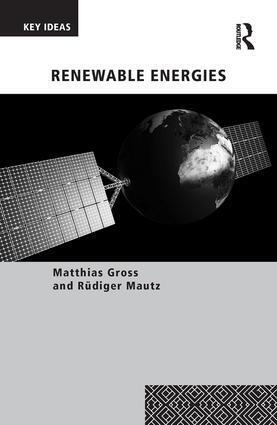
Zustellung: Fr, 08.11. - Mo, 11.11.
Versand in 4 Tagen
VersandkostenfreiBestellen & in Filiale abholen:
This concise book focuses on the importance of the global aspects of alternative energy consumption. Focusing on theories of energy use and possible energy transition, Renewable Energies delivers an accessible overview on the relationships between different types of energy production and their practical usages in modern societies. It evaluates different types of energy production, not independently from each other, but as culturally and socially dependent on one another. The book also reflects on challenges for social science analysis in a politically steered realm of research.
Renewable Energy normally refers to usable energy sources that are an alternative to fuel sources, but without the negatively evaluated consequences of the replaced fuels. Although energy issues have a long tradition in sociology and other social sciences, it may now be high time to conceptualize these in sociological terms as the lynchpin in our understanding of the way societies are set to develop in the 21st century.
This concise book focuses on sociological attempts at better framing contemporary theories of energy transformations and to deliver an accessible overview on the relationships between different types of renewable energy sources and their practical usages in modern societies. A strong focus is laid upon new forms of environmental governance and unavoidable knowledge gaps triggered by attempts to transform contemporary energy systems to renewable ones.
Critical topics include the challenge of transition from centralized to decentralized system structures, the integration of renewable energies into existing energy structures or the replacement of these, coping strategies to unforeseen risks and conflict issues, and socio-cultural reservations to new technologies connected to renewable energies.
Inhaltsverzeichnis
1. Introduction: The next great experiment 2. Energy and Society: Energetic foundations of sociology 3. Contemporary Social Theories of Energy Transitions 4. Wind, Solar, and Biomass in Sociotechnical Transition 5. Renewable Energy from Below the Ground 6. Political Regulation and New Forms of Environmental Governance 7. Energies in Conflict: New restraints and old obstacles 8. Integrating Renewable Energies into Existing Electricity Systems 9. Conclusion: Nonknowledge and Exnovation as Progress
Mehr aus dieser Reihe
Produktdetails
Erscheinungsdatum
12. Oktober 2015
Sprache
englisch
Seitenanzahl
184
Reihe
Key Ideas
Autor/Autorin
Matthias Groß, Rüdiger Mautz
Verlag/Hersteller
Produktart
kartoniert
Abbildungen
3 SW-Abb., 3 SW-Zeichn., 3 Tabellen
Gewicht
190 g
Größe (L/B/H)
10/129/198 mm
ISBN
9781138194519
Entdecken Sie mehr
Pressestimmen
'The ongoing transition to renewable energy sources is much more than a substitution of fossil fuels by alternative energy carriers. The great merit of this book is to shed light on the interdependency of new forms of energy provision with profound changes in our societies and to show that social sciences are essential for understanding this challenge.' - Harald Rohracher, Professor of Technology and Social Change, Linköping University
It is a great merit of this book to alert to the effects of the energy transition as a real world experiment. [. . .] Gross and Mautz clarify that such real world experiments cannot be assessed with classical tools of risk assessments since there are no models or reliable data available to cope with the complexity of the processes involved. Therefore, a high level of ignorance is involved so that trust in experts and politics becomes ever more important. - Christian Büscher, Technology Assessment: Theory and Practice
Bewertungen
0 Bewertungen
Es wurden noch keine Bewertungen abgegeben. Schreiben Sie die erste Bewertung zu "Renewable Energies" und helfen Sie damit anderen bei der Kaufentscheidung.













